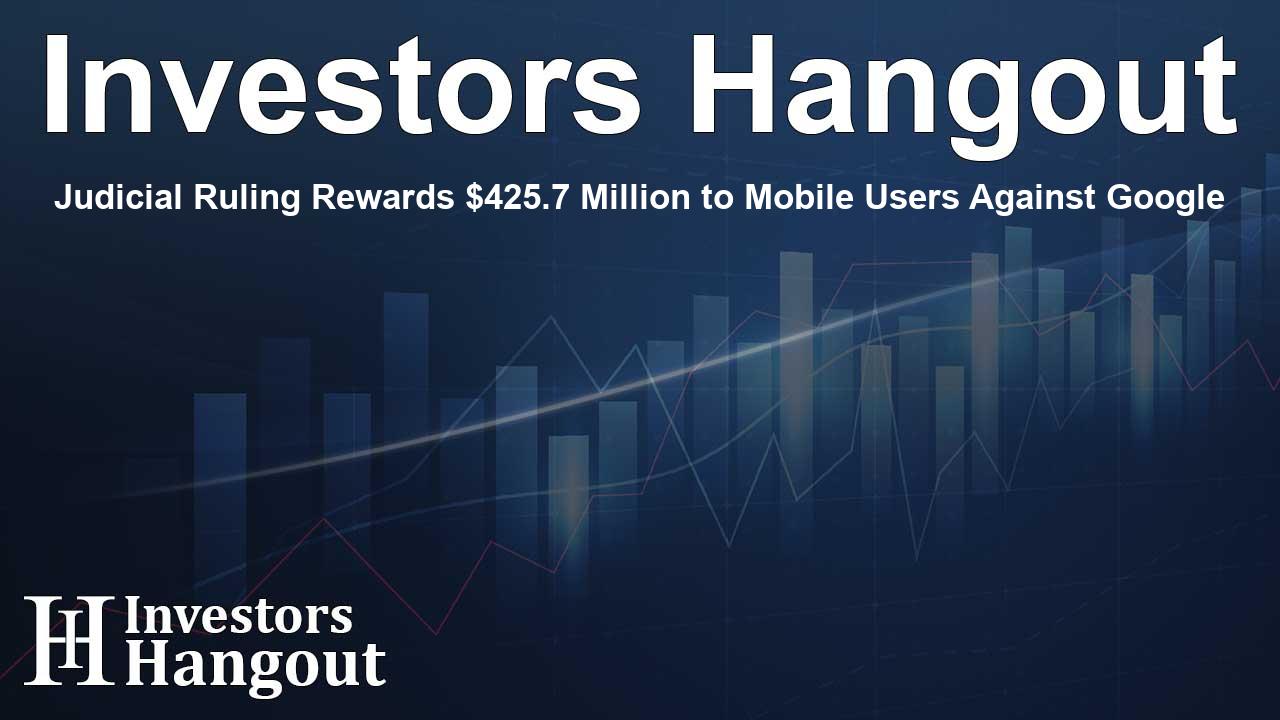Judicial Ruling Rewards $425.7 Million to Mobile Users Against Google

Introduction to the Landmark Case
A compelling verdict has emerged from a significant legal battle in which a jury awarded $425.7 million to mobile device users against Google. This pivotal case, involving the collection of data without user consent, highlights the essential issues of privacy in today's digital age. It serves as a crucial reminder of the responsibilities tech companies owe to their users.
Background of the Case
The legal proceedings stem from allegations that Google continued to collect user data even after individuals had opted out of the "supplemental Web and App Activity" (sWAA) service. Since 2016, users were assured by the tech giant that turning off this feature would halt all data collection from third-party applications utilizing Google’s data services. However, the plaintiffs argued that their data was collected against their will, prompting legal action in a case titled Rodriguez, et al. v. Google LLC.
The Legal Implications
The jury's verdict was not just a result of financial calculations but a profound recognition of privacy rights and digital ethics. By finding Google liable for invasion of privacy and intrusion upon seclusion, the ruling underscores the legal responsibilities placed on technology firms regarding user consent and data handling practices.
Role of Legal Teams
DRC, a prominent legal consulting agency, played a vital role in supporting the trial teams through jury research and strategic consultation. John Dubin, DRC’s founder, praised the legal teams from Susman Godfrey LLP and Boies Schiller Flexner LLP for their relentless pursuit of justice. The collective dedication of these firms highlights the efforts involved in navigating complex legal landscapes surrounding technology and privacy.
The Significance of the Verdict
This verdict not only compensates the 98 million affected users but also sets a precedent in the tech industry regarding privacy violations. It sends a clear message that privacy matters, and that juries are willing to hold large organizations accountable for breaches of trust. This decision is a resounding affirmation of user rights in an era dominated by data collection practices.
Future of Privacy Legislation
In the aftermath of this ruling, discussions surrounding privacy legislation are likely to intensify. Lawmakers and regulators will need to consider the implications of such verdicts as they work towards establishing more comprehensive privacy protections for consumers. Moving forward, it is critical that companies prioritize user privacy and transparency in their data collection practices to foster trust and compliance.
Global Reaction and Future Considerations
The ruling has garnered attention not just within the United States but globally, as various countries grapple with similar issues related to data privacy. This case may influence ongoing debates and legislation in other jurisdictions about technology companies' responsibilities when it comes to user consent and protection. Companies around the world might need to reassess their own privacy policies in light of this verdict.
Conclusion
The $425.7 million jury award marks a significant moment in the ongoing battle for users' digital rights against major tech corporations. It reinforces the notion that privacy is paramount and cultivates a culture of accountability for organizations handling personal data. As discussions about technology and user rights continue to evolve, this case serves as a foundational example of the judiciary's role in protecting individual privacy in an increasingly interconnected world.
Frequently Asked Questions
What was the verdict against Google?
The jury awarded $425.7 million to mobile device users whose data was collected by Google without their consent.
What were the allegations against Google?
The allegations centered around Google's collection of user data despite users opting out via the 'sWAA' privacy setting.
Which law firms were involved in the trial?
Susman Godfrey LLP, Boies Schiller Flexner LLP, and Morgan & Morgan represented the plaintiffs in the case.
What are the implications of this ruling?
This ruling sets a legal precedent, enhancing user privacy rights and holding tech companies accountable for data violations.
How might this affect future privacy legislation?
The case may prompt more stringent privacy laws and regulations, encouraging tech companies to prioritize user consent in data collection.
About The Author
Contact Olivia Taylor privately here. Or send an email with ATTN: Olivia Taylor as the subject to contact@investorshangout.com.
About Investors Hangout
Investors Hangout is a leading online stock forum for financial discussion and learning, offering a wide range of free tools and resources. It draws in traders of all levels, who exchange market knowledge, investigate trading tactics, and keep an eye on industry developments in real time. Featuring financial articles, stock message boards, quotes, charts, company profiles, and live news updates. Through cooperative learning and a wealth of informational resources, it helps users from novices creating their first portfolios to experts honing their techniques. Join Investors Hangout today: https://investorshangout.com/
The content of this article is based on factual, publicly available information and does not represent legal, financial, or investment advice. Investors Hangout does not offer financial advice, and the author is not a licensed financial advisor. Consult a qualified advisor before making any financial or investment decisions based on this article. This article should not be considered advice to purchase, sell, or hold any securities or other investments. If any of the material provided here is inaccurate, please contact us for corrections.
